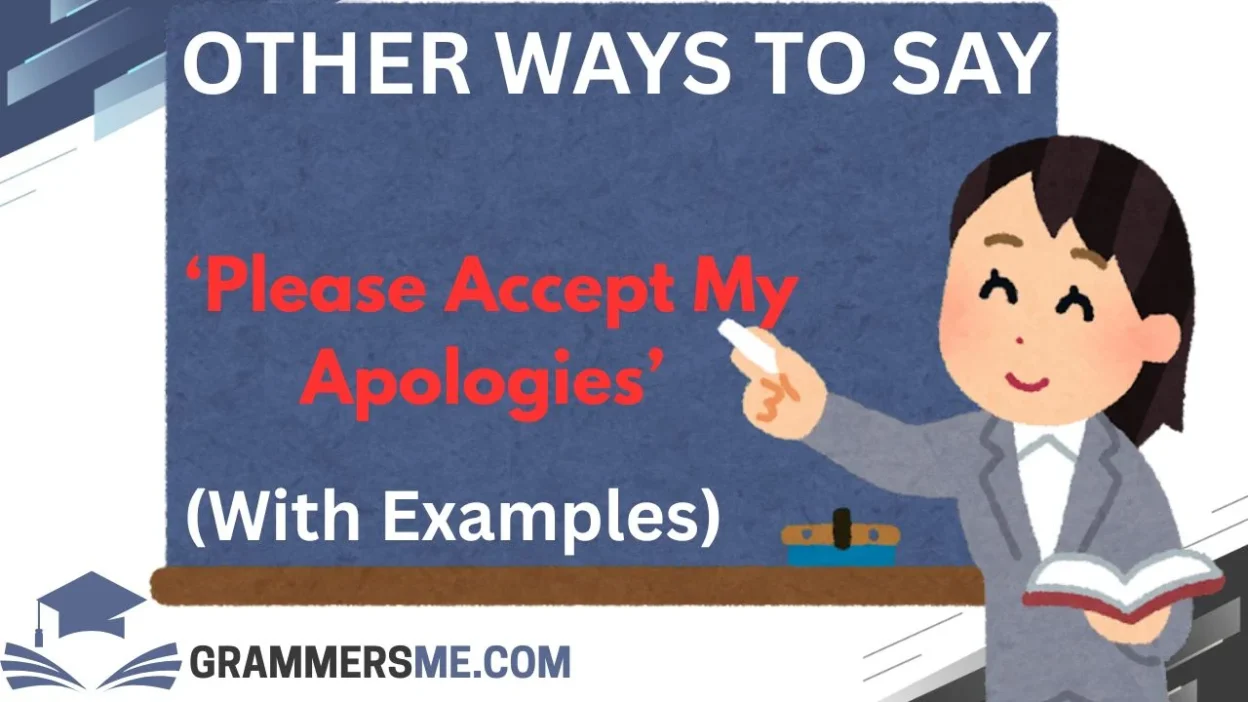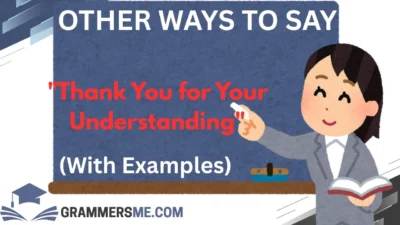When it comes to expressing remorse or regret, finding the right words can make all the difference in how your message is received. Whether you’ve hurt someone’s feelings or simply made a mistake, saying “please accept my apologies” can be a way to show that you care deeply about the relationship. However, sometimes, personalizing your apology can make it feel more sincere and meaningful.
In this article, we’ll explore 30 different ways to say “Please Accept My Apologies,” each with examples and guidance on when to use them. These alternatives can help you convey your message with warmth and care, ensuring that your apology resonates with empathy and understanding.
What Does “Please Accept My Apologies” Mean?
To “please accept my apologies” is a formal or polite way of expressing regret or remorse for something that may have caused inconvenience, hurt, or disappointment. It is often used when you want to show humility and a willingness to make amends for an action or statement.
This phrase conveys an understanding that an apology is required, and you are taking responsibility for any offense, whether intentional or not. It invites the recipient to accept your sincere expression of regret.
Is It Professional/Polite to Say “Please Accept My Apologies”?
Yes, the phrase “please accept my apologies” is both professional and polite. It is commonly used in formal business or personal contexts when someone needs to express regret for an action or mistake. This phrase shows that the speaker is acknowledging their mistake and seeking to repair any potential damage. While formal, it can still feel warm and sincere when used with the right tone.
1. “I Owe You an Apology”
Meaning: This phrase emphasizes a sense of responsibility and accountability for the wrongdoing.
Detailed Explanation: Saying “I owe you an apology” implies that an apology is something the person deserves. It acknowledges the wrong and expresses a desire to correct it. It’s an effective way to take full ownership of your actions.
Scenario Example:
“I realize that I was harsh in our last conversation, and I owe you an apology for that.”
Best Use: When you want to openly admit that the person has a right to be upset and that you owe them an explanation or an apology.
Not Use: In situations where you want to convey a lighter or less formal tone, as this might sound heavy-handed.
2. “I’m Sorry for What Happened”
Meaning: A direct and simple way to express regret for an event or situation.
Detailed Explanation: This phrase offers a straightforward approach to apologizing. It acknowledges that something negative occurred without necessarily detailing the issue.
Scenario Example:
“I’m sorry for what happened at the meeting. I shouldn’t have interrupted you.”
Best Use: In informal or personal contexts, when you want to apologize quickly and without over-explaining.
Not Use: In formal or professional situations where a more specific or thoughtful apology is needed.
3. “I Regret My Actions”
Meaning: This phrase shows deep remorse for one’s behavior or decisions.
Detailed Explanation: “I regret my actions” takes responsibility and shows that you have reflected on your behavior and feel sorrow about it.
Scenario Example:
“I regret my actions during the meeting, and I will do my best to ensure it doesn’t happen again.”
Best Use: In serious situations where you want to convey deeper remorse and reflection.
Not Use: When the apology is minor or in a casual setting, as it may sound too intense.
4. “Please Forgive Me”
Meaning: A request for the recipient to pardon your actions or behavior.
Detailed Explanation: This phrase is often used when you feel that the other person has been deeply hurt and you are asking for forgiveness.
Scenario Example:
“I was out of line last night. Please forgive me for my words.”
Best Use: When you are looking for reconciliation and want to explicitly ask for the person’s forgiveness.
Not Use: When you want a more neutral or less emotionally charged apology.
5. “I Was Wrong, and I’m Sorry”
Meaning: This phrase is a straightforward acknowledgment of wrongdoing and an expression of regret.
Detailed Explanation: Saying “I was wrong” is a powerful way to show that you fully accept your mistake, while “I’m sorry” reinforces the sincerity of your apology.
Scenario Example:
“I was wrong to raise my voice at you earlier. I’m sorry.”
Best Use: When you want to take full responsibility for your actions and offer a clear, direct apology.
Not Use: When you are not ready to admit your fault or when a more formal apology is required.
6. “I Apologize for My Behavior”
Meaning: A formal and respectful way to acknowledge inappropriate conduct.
Detailed Explanation: This phrase can be used when you want to show that your behavior was out of line but in a formal manner.
Scenario Example:
“I apologize for my behavior at the dinner last night. It was inappropriate, and I deeply regret it.”
Best Use: In professional or formal settings when your behavior has been inappropriate and you need to address it.
Not Use: In situations where the behavior was minor or when a more casual tone would be better.
7. “I’m Truly Sorry”
Meaning: An emotional, heartfelt way to express deep regret.
Detailed Explanation: Adding “truly” to the apology emphasizes the depth of your feelings, indicating that you are genuinely remorseful.
Scenario Example:
“I’m truly sorry for not following through on my promise. I know I let you down.”
Best Use: When you want to communicate a strong, heartfelt apology.
Not Use: In situations where the apology is less sincere or if the issue is minor.
8. “I Take Full Responsibility”
Meaning: This phrase highlights the speaker’s acceptance of responsibility for their actions.
Detailed Explanation: This is a very formal, accountable apology that emphasizes the person’s willingness to own up to their mistakes.
Scenario Example:
“I take full responsibility for missing the deadline. I should have managed my time better.”
Best Use: When you want to show full accountability for a situation.
Not Use: In more casual or informal contexts, as it may sound too formal.
9. “I Didn’t Mean to Hurt You”
Meaning: A way to express that your actions were unintentional.
Detailed Explanation: This phrase acknowledges that while you may have caused harm, you did not do so on purpose, expressing a desire to prevent future misunderstandings.
Scenario Example:
“I didn’t mean to hurt you when I made that comment. I realize now how it came across.”
Best Use: When you want to clarify that your actions were unintentional but still wish to apologize for the harm caused.
Not Use: If your actions were indeed intentional or if a more formal apology is necessary.
10. “I’m Deeply Sorry for the Pain I Caused”
Meaning: A heartfelt and empathetic expression of sorrow for causing emotional distress.
Detailed Explanation: This phrase conveys a deeper level of empathy, showing that you understand the emotional toll of your actions and that you regret causing the other person pain.
Scenario Example:
“I’m deeply sorry for the pain I caused with my words. I didn’t realize how much it hurt you.”
Best Use: In personal situations where emotions are involved, and you want to acknowledge the emotional impact.
Not Use: In situations where the apology is more practical than emotional.
11. “I Was Out of Line”
Meaning: A direct acknowledgment that your behavior was inappropriate or overstepped boundaries.
Detailed Explanation: This phrase shows that you recognize your actions were wrong and that you were not acting in the right way. It is often used to describe moments when you’ve behaved in a manner that was disrespectful or inconsiderate.
Scenario Example:
“I was out of line with my comments during the meeting. I understand why you’re upset.”
Best Use: When you recognize your behavior was improper or inappropriately aggressive.
Not Use: In situations where the issue is more about a misunderstanding than an action.
12. “I Want to Make It Right”
Meaning: This phrase conveys a sense of commitment to correcting the mistake and making amends.
Detailed Explanation: It shows that you’re not just apologizing for the sake of it but are also focused on how to resolve the issue and prevent it from happening again.
Scenario Example:
“I want to make it right by ensuring I meet all the deadlines from now on.”
Best Use: When you not only want to apologize but also actively work towards making improvements or fixing the problem.
Not Use: If you’re unsure of how to fix the issue or have no immediate plans to make it right.
13. “I Can’t Take Back What Happened, But I’m Sorry”
Meaning: A way to acknowledge that although you cannot undo the past, you regret the outcome.
Detailed Explanation: This phrase admits that while the mistake or event is irreversible, you still feel remorseful about it and wish it had turned out differently.
Scenario Example:
“I can’t take back what happened during our conversation, but I’m truly sorry for how things went.”
Best Use: When you want to recognize that something can’t be undone but that you still care about the other person’s feelings.
Not Use: When you’re hoping to undo the situation or expect immediate forgiveness.
14. “I Misunderstood the Situation”
Meaning: An apology where you admit to having been mistaken about the circumstances.
Detailed Explanation: This phrase can be helpful when the issue was based on a misunderstanding. It shows that you recognize the confusion but regret any harm caused.
Scenario Example:
“I misunderstood the situation and overreacted. I apologize for that.”
Best Use: In situations where there was confusion or a lack of clarity that led to an unintended issue.
Not Use: When the issue wasn’t a misunderstanding, but a more direct mistake or wrongdoing.
15. “I Should Have Handled That Better”
Meaning: This apology reflects self-awareness and shows that you recognize how you could have acted differently.
Detailed Explanation: It conveys a sense of regret for not choosing a better course of action and acknowledges that you can do better in the future.
Scenario Example:
“I should have handled that better, and I apologize for the way I acted earlier.”
Best Use: When you realize that your actions weren’t ideal, and you want to express the desire to improve.
Not Use: If you have no intention of improving or don’t acknowledge the severity of your actions.
16. “That Was Thoughtless of Me”
Meaning: A way to admit that your actions were careless and lacked consideration.
Detailed Explanation: This apology is often used when you realize that you made a mistake without thinking of how it might affect others. It shows that you understand your actions were unthoughtful and thoughtlessly hurtful.
Scenario Example:
“That was thoughtless of me, and I understand how it hurt your feelings. I’m truly sorry.”
Best Use: When the mistake was something done without thinking and you want to highlight your lack of consideration.
Not Use: When the action was intentional or had more severe consequences.
17. “Please Accept My Sincere Apologies”
Meaning: A formal and earnest way to request that the other person accept your remorse.
Detailed Explanation: This phrase emphasizes that your apology is heartfelt and sincere. It’s used when you want to convey a deep sense of regret.
Scenario Example:
“Please accept my sincere apologies for the misunderstanding that occurred.”
Best Use: In formal contexts, especially when addressing a serious mistake that requires acknowledgment.
Not Use: In casual settings where a less formal apology would be more appropriate.
18. “I Didn’t Mean to Offend You”
Meaning: A way to acknowledge that your actions unintentionally hurt the other person.
Detailed Explanation: This phrase is effective when you recognize that you said or did something that unintentionally offended someone, and you want to clarify that it wasn’t your intention.
Scenario Example:
“I didn’t mean to offend you with my comment. I apologize for any hurt I caused.”
Best Use: In situations where you realize that the offense was unintentional and you want to clarify your intentions.
Not Use: If the offense was intentional or serious.
19. “I’m Sorry for My Part in This”
Meaning: Acknowledging your role in a situation where multiple factors contributed to the issue.
Detailed Explanation: This apology shows that you recognize your specific involvement in a problem, even if there were other contributing factors.
Scenario Example:
“I’m sorry for my part in this disagreement, and I want to make sure we can resolve it together.”
Best Use: When you were involved in a situation that was not solely your fault but you still want to take responsibility for your actions.
Not Use: In situations where you want to avoid responsibility or downplay your involvement.
20. “I Should Have Known Better”
Meaning: Acknowledging that you made a mistake despite knowing what the right course of action should have been.
Detailed Explanation: This phrase reflects an understanding that, given your knowledge or experience, you should have acted differently. It’s a way to admit that you fell short of expectations.
Scenario Example:
“I should have known better than to make that decision without consulting you first. I’m sorry.”
Best Use: When you feel that you should have made a better choice and want to take responsibility for it.
Not Use: When the mistake was due to lack of knowledge or a genuine misunderstanding.
21. “I Can’t Express How Sorry I Am”
Meaning: A heartfelt and deep apology that conveys a struggle to fully express your regret.
Detailed Explanation: This phrase emphasizes that words are not enough to convey how deeply sorry you are, underscoring the sincerity and depth of your remorse.
Scenario Example:
“I can’t express how sorry I am for what I did. I truly regret my actions.”
Best Use: When you feel that your apology doesn’t fully capture the depth of your remorse.
Not Use: When you feel your apology is simple and doesn’t require intense emotional expression.
22. “I Apologize for My Mistake”
Meaning: A direct admission of error, signaling that you recognize the mistake and are willing to accept responsibility.
Detailed Explanation: This phrase is simple and to the point, acknowledging that you made a mistake and expressing regret for it. It conveys that you’re not avoiding the situation but confronting it head-on.
Scenario Example:
“I apologize for my mistake in overlooking the details of the report. It was careless, and I’ll make sure to double-check in the future.”
Best Use: In both personal and professional settings when you want to admit to a specific error or oversight.
Not Use: When the issue is a misunderstanding or when more empathy and explanation are needed.
23. “I Deeply Regret My Actions”
Meaning: A stronger expression of regret, conveying deep remorse for your actions.
Detailed Explanation: This phrase conveys a profound sense of sorrow and responsibility for your actions. It’s a more formal and serious way of expressing regret, often used in situations where the impact of your actions is significant.
Scenario Example:
“I deeply regret my actions during the team meeting. My behavior was unprofessional, and I apologize for any discomfort I caused.”
Best Use: When the situation calls for a sincere, serious, and heartfelt apology.
Not Use: For smaller, less impactful mistakes where the apology may feel overly dramatic.
24. “I Feel Terrible About What Happened”
Meaning: A candid expression of sorrow, showing that you genuinely feel bad about the outcome.
Detailed Explanation: This phrase emphasizes the emotional toll that the situation has had on you. It conveys that you are not just apologizing out of obligation but are personally affected by the outcome.
Scenario Example:
“I feel terrible about what happened between us. I never intended for things to go this way.”
Best Use: In personal situations where you are deeply affected by the outcome and want to show empathy.
Not Use: When the situation is less serious or when a more neutral apology is more appropriate.
25. “I Apologize for Any Inconvenience I Caused”
Meaning: A polite, formal way to apologize for causing disruption or difficulty.
Detailed Explanation: This phrase is commonly used in professional settings or formal contexts where the apology is about a situation that affected someone’s schedule, comfort, or convenience. It is often used in customer service or business communications.
Scenario Example:
“I apologize for any inconvenience I caused by missing our appointment. I’ll make sure to reschedule as soon as possible.”
Best Use: In professional or formal situations where the mistake led to some inconvenience.
Not Use: In personal settings where a more heartfelt apology would be better.
26. “I Never Meant for This to Happen”
Meaning: A way of expressing that you had no intention of causing the negative event.
Detailed Explanation: This phrase shows that the event was entirely unintentional and highlights that your actions were not meant to have the consequences that they did.
Scenario Example:
“I never meant for this to happen. I was only trying to help, and I now see that I made things worse.”
Best Use: When the mistake was truly unintentional and you want to convey that it wasn’t planned or thought out.
Not Use: If the situation was due to negligence or oversight, as it could be seen as making excuses.
27. “I Was Thoughtless and I’m Sorry”
Meaning: Acknowledging that your actions lacked consideration or care for others.
Detailed Explanation: This apology highlights the lack of thought or care in your actions, showing that you recognize the consequences of being inconsiderate or hasty.
Scenario Example:
“I was thoughtless when I didn’t consult you before making that decision. I’m sorry for not including you.”
Best Use: When you realize that you acted impulsively or without considering the other person’s feelings.
Not Use: When the situation was not one of thoughtlessness but more about misunderstanding or oversight.
28. “I Realize I Made a Mistake”
Meaning: A humble acknowledgment of your wrongdoing.
Detailed Explanation: This phrase emphasizes self-awareness and acceptance of responsibility. It shows that you are recognizing the error without excusing it, signaling personal growth.
Scenario Example:
“I realize I made a mistake in my approach, and I sincerely apologize for any frustration it caused.”
Best Use: When you want to convey that you’ve learned from the mistake and are ready to move forward.
Not Use: When you don’t truly understand the mistake or its impact.
29. “I Wish I Could Have Handled That Differently”
Meaning: A reflective apology that shows regret for not handling a situation in a better way.
Detailed Explanation: This phrase implies that you’ve given thought to the situation and wish you had acted in a more effective or considerate manner. It conveys a desire to do better in the future.
Scenario Example:
“I wish I could have handled that differently. My response was too harsh, and I apologize for it.”
Best Use: When you’ve had time to reflect on your actions and feel regretful about how you approached the situation.
Not Use: In cases where you feel no regret or when the situation didn’t require much reflection.
30. “I Apologize from the Bottom of My Heart”
Meaning: A deeply sincere apology that expresses true emotional regret.
Detailed Explanation: This is a heartfelt way of apologizing, emphasizing the depth of your remorse. It conveys that your apology comes from a very genuine place, showing that you truly care about the other person’s feelings.
Scenario Example:
“I apologize from the bottom of my heart for letting you down. I understand how much this has hurt you, and I will do everything I can to make it right.”
Best Use: In situations where the impact of your actions was significant, and you want to show sincere empathy and remorse.
Not Use: For minor offenses or when the situation doesn’t warrant an emotional apology.
Conclusion
Apologizing is more than just saying “I’m sorry.” It’s an opportunity to show empathy, take responsibility, and make amends for actions that may have caused harm. With these 30 alternatives for expressing regret, you now have a variety of ways to communicate your feelings in a manner that feels genuine, personal, and considerate.
Whether you’re looking to express regret in a professional context or want to convey a heartfelt apology in a personal situation, these phrases can help you find the right words to rebuild trust and show care.
FAQs
- How do I decide between a simple apology and a more elaborate one?
Consider the severity of the situation. For minor issues, a simple apology might suffice. For more serious offenses, a more elaborate, heartfelt apology will be better received. - What if I’m not sure if my apology will be accepted?
Focus on sincerity and offer your apology without expectations. Sometimes, it may take time for the other person to accept, but your willingness to apologize is a step in the right direction. - How do I apologize if the other person is angry and not ready to listen?
In such situations, give the other person time and space. Let them know you are genuinely sorry and open to talking when they are ready. - Should I apologize even if I don’t think I did anything wrong?
It’s often helpful to apologize for the impact your actions had, even if you didn’t intend harm. Apologizing for the effect rather than the cause can help maintain harmony. - How can I ensure my apology is accepted?
To make your apology more likely to be accepted, be sincere, take responsibility, and show a willingness to change. Offering a solution or an act of goodwill can also help demonstrate your commitment to improving.




